- Home
- Richard Matheson
The Gun Fight Page 4
The Gun Fight Read online
Page 4
Agatha Winston sat down on the couch with one sure motion, legs and back making a perfect right angle, face stern with righ teous indignation.
“She’s told you nothing?” she asked her sister.
The widow Harper’s lower lip trembled. “Told me about what?” she asked, eyes almost frantic.
Miss Winston drew in a harsh breath. “I think we had better ask Louisa about that,” she said. “I don’t even want to speak of it until I hear what she has to say.” She stood, a bleak wraith of resolution. “Come,” she said.
Elizabeth Harper fluttered up. “Agatha, please. What is it?” she begged.
Agatha Winston clasped gaunt hands before her breast.
“What do you know of Mister John Benton?” she asked bluntly.
Her sister stared back without comprehension. “John Benton?” she repeated the name. “What—”
“Early this afternoon—about two o’clock I’ll allow—Mrs. Van Dekker came into the shop.” Agatha Winston’s dark eyes probed at her sister’s. “She told me something that made me shudder . . . positively shudder, Elizabeth.”
Elizabeth Harper pressed trembling fingers to her lips and stared fearfully at her sister.
“I won’t go into detail,” Miss Winston said firmly. “The story may not even be true—I pray to heaven it isn’t—but it concerns this John Benton and . . .” Her lips pressed together. “. . . Louisa,” she finished.
Louisa Harper was dreaming. Across the lilac spread of her bed, her sixteen-year-old body lay, stomach down, chin propped up by delicately cupped hands. Her blue eyes stared vacantly out of the window. She was taking that ride again.
She had taken it a hundred times, maybe more. It was almost always the same. The petty details of its genesis were ignored. That she could not ride and was frightened to death of horses mattered little. She was out on the range again, riding, her light chestnut hair flowing in the wind, her firm body jolting with the cantering gait of the horse. The sun was bright—for now.
Then the complication, the always occurring complication. Louisa Harper’s lips stirred, her mind stared deeper into her dream.
A rattlesnake, a road runner, a jackrabbit—the actual cause was not important. All that mattered was the result; her horse shying, rearing up with a head-jerking whinny, then breaking into a frightened gallop across the brush country. Her scream of terror pulsing in the hot air . . .
. . . and heard.
Her body squirmed a little, her stomach pressing slightly at the bedspread. A movement at her smooth throat. The horse galloping, galloping, her holding on with desperate fear, screaming and hysterical.
Then, out of the mist of her dream, the horse man riding, tall and erect in the saddle, his clothes dark, his hat hanging off his shoulders by its bonnet strings, his blond hair ruffling in the high wind. Closer and closer, the horse man coming, handsome face resolute, one strong hand on the reins, the other half raised toward her . . .
She kept the scene alive; it fascinated her with its terrible thunder of hooves, its pulse-quickening suspense—with the inevitability of its delicious conclusion.
Which came in a sudden command of her will. Her breath caught, her hands were numb. She felt herself swept off the bolting mount and pulled harshly against the tall rider. The horse reined up and, there they were, alone in the vast, empty range, close together on the tall man’s horse.
Oh, Mr. Benton, thank you for saving me.
His eyes gentle on her, his strong arm seeming to tighten around her slender waist. Or was that imagination?
My pleasure, Miss Harper, he said. She felt the butt of his pistol pressing at her hip and it made her shiver.
The scene running, coagulating, breaking again into clarity. Sunlight driven from the sky by needs of plot, deepening shadows over the earth, gray menace swirling in the sky.
Oh, it’s going to rain, Mister Benton. We’ll get soaked.
I know a place where we can wait out the storm.
Rain failing, a sudden desired squall of it. A small cave in the hills, far from town. But they didn’t reach the cave in time and both of them were soaked. Louisa stood by the abruptly built fire, blouse clinging wetly to her swelling form. I don’t care if he sees, I don’t.
You’d better take off those clothes, Miss Harper.
Why, Mr. Benton.
That smile, that throat-catching smile. I’ll look the other way. We have to get our clothes off though or we’ll catch our death of cold.
Scene changing, blurring, transition uncertain, unclear—but definite. Her in her shift, a blanket across her smooth white shoulders. Him with his shirt off; her eyes stealing across the hard-muscled bronze of his torso.
Listen to the wind. His deep, his wonderful voice. Looks like we may be caught here quite a spell.
I don’t care.
The sudden look exchanged; beneath the blanket, her small hands trembling. I said it to him and I’d say it again.
Coffee, somehow made, the two of them drinking it in the warm cave, looking into the orange flicker of the fire, the sparks like fireflies darting up into the darkness. The hot trickle of coffee in her throat; suspense. Her young body writhed a little on the bed, throat dry, mouth dry.
The blanket slipping off one shoulder; her leaving it that way. Let him see me, I don’t care. His eyes glowing in the firelight, the rain pouring and rushing outside in the black night. His hands reaching.
Sudden wild excitement Oh, John, John! . . .
“Louisa?”
She started sharply on the bed at the sound of her mother’s frail voice in the hallway. At once, her delicate features twisted into angry lines. The cave scene went funneling down into the bottomless well of thought and Louisa looked at the door with fierce resentment.
“What is it?” she asked.
“May we come in, dear?”
One small fist beat down angrily on the bedspread. Louisa rolled over and sat up, her legs dropping over the edge of the mattress. She swallowed heavily, her mouth feeling feather-dry. We? she thought.
“Come in,” she said sullenly, glancing down at herself. As the knob turned, she ran smoothing fingers over the wrinkles of her skirt.
The two women entered.
“Aunt Agatha,” Louisa said, feeling a sudden dropping sensation in her stomach at the appearance of her aunt.
Agatha Winston nodded brusquely at her pretty niece, then, when her sister failed to do so, she shut the door firmly as though to close away all intruding eyes. Louisa glanced covertly at her aunt while the widow Harper came over to the bed, an uncertain smile on her face.
“What is it, mother?” Louisa asked, her eyes lowering now to avoid the gaze of her turning aunt.
“Well, dear, we—”
“We want to speak to you, Louisa,” Agatha Winston said, assuming, as her natural due, the role of inquisitor.
That sinking in her stomach again. “Talk to me?” asked Louisa faintly, trying hard to remember if she’d done anything to offend her aunt. Was she supposed to have come to the shop today? No, it couldn’t be that; she only worked there Mondays, Wednesdays, and Fridays in return for the financial aid Aunt Agatha gave to them.
The bed creaked as Louisa’s mother sat down gingerly beside her. Louisa glanced at her with the effort of a smile trying her lips. “What is it, mother?” she asked.
Her mother smiled nervously, then glanced toward Agatha for help.
“Louisa,” said her aunt.
“Yes, Aunt Agatha.”
“I am going to ask you a question to which I expect an honest answer.” Agatha Winston leaned forward, her beak-like nose aiming at Louisa like a spear point, her black eyes searching. “Remember, Louisa,” she cautioned, “there’s nothing to be afraid of as long as you tell the truth.”
“Darling,” murmured Elizabeth Harper, covering one of her daughter’s hands with her trembling own. Louisa glanced nervously at her mother, then back again to her aunt. She didn’t understand.
Au
nt Agatha said, “What has John Benton to do with you?”
Louisa couldn’t stop the catching of breath in her throat, the paling of cheek, the startled widening of her eyes.
“John Ben—” she began, then stopped, her voice failing. She felt her heart beating heavily and had the pointed sensation of her mind being ripped open, her most secret thoughts plucked out, naked and terrible. For a second she thought she might faint so strong was the welling of shock.
Agatha Winston straightened up with a look of vulpine self-justification on her lean face. She glanced once at the lined face of her sister, then back to Louisa whose cheeks were now coloring embarrassedly.
“W-why do you ask that, Aunt . . .” Louisa swallowed hastily, “. . . Agatha?” she finished.
“What has John Benton to do with you?”
“N-nothing, Aunt Agatha. I don’t even—”
“Louisa.” Aunt Agatha’s voice threatened and Louisa stopped talking. “You have nothing to be afraid of as long as you tell the truth like the good Christian girl I hope you are.”
Numbly, Louisa felt her aunt’s gaunt hand fall on her shoulder.
“But—” she began.
“We expect the truth, Louisa,” her aunt said.
Louisa stopped again and sat there, heart pulsing heavily in her chest.
“There was a fight this morning, Louisa,” Agatha Winston said. “Between John Benton and the young man you will probably marry.”
“Rob—” Louisa’s voice broke off and she stared up speechlessly at the hard face of her aunt. She wanted to run from the room; go anywhere to get away from her aunt. Her throat moved in a convulsive swallow. I didn’t mean it, the thought wavered across her mind, I didn’t mean it at all . . .
“The facts are not clear,” Aunt Agatha said in concise tones, “but it appears that young Coles was defending your honor against that . . . man.”
Louisa felt herself drawing in, backed into a defenseless corner. How could this have happened? She’d had no idea Robby would take her joking taunt so seriously. She’d only wanted to make him angry and jealous and put some life into him.
“Darling, what did that terrible man do to you?” Elizabeth Harper asked in a faint voice, fearing the worst.
“Mother, I don’t—”
“Before we go any further, Louisa,” her aunt said crisply, “I want you to know that this is a very serious matter. We must have the truth. If you lie, you will be severely punished, do you understand?” She ignored the startled look on her sister’s face. “This is a matter of grave importance to your very future.”
Louisa looked at her aunt with frightened eyes. It wasn’t a lie, her mind struggled to explain. It was only a joke, I only wanted to make him jealous. But she knew her aunt wouldn’t see it that way. I didn’t mean anything, she thought in anguish.
“Did John Benton attempt to arrange an immoral meeting with you?” Agatha Winston demanded bluntly.
Louisa pressed trembling fingers to her lips, her eyes stark with fright. “No,” she murmured. “No, he—”
“Don’t lie to us, Louisa!”
Louisa began sobbing. She felt warm tears falling across her cheeks as she sat there, shaking without control, hardly feeling the pressure of her mother’s arm around her back, hardly hearing the frail voice trying to comfort her. Through the blurring prisms of her tears, Louisa saw the shapeless black form of her aunt standing over her. She wanted to tell the truth. She wanted to tell them that she’d only made it up but she was afraid of her aunt, she didn’t want to be punished for lying. She was afraid of being scorned, terror-stricken at the thought of anyone knowing her secret. . . .
“When did this happen?” Agatha’s voice came breaking down over her like a spray of ice.
“I don’t know, I d-don’t know!” Louisa sobbed and the widow Harper looked up imploringly at her sister.
“Please, Agatha,” she begged, “no more. She’s too upset.”
“We must know the facts.”
“It’s not important!” Louisa blurted out suddenly, her voice rising brokenly. “It isn’t important, Aunt Agatha!”
“It is very important,” the answer came sternly. “Your honor is the most important thing in your life.”
“But I didn’t—” Fear broke off Louisa’s words again and she slumped over, shoulders trembling helplessly.
“No, you didn’t tell us immediately,” Agatha interpreted her niece’s unfinished sentence. “You told Robby Coles and he did what he had to do; went up against that . . . that killer to defend your honor. You should be grateful that your honor is so highly regarded.”
“Agatha, please,” begged her sister.
“Come, Elizabeth.”
“I’d like to stay with her, Agatha, and . . .”
She stopped as Agatha’s bony hand closed over her shoulder firmly. Agatha shook her head. “Come,” she said again and Elizabeth was drawn up nervously, one shaking hand patting at Louisa’s soft hair.
“Darling, don’t fret now,” her mother tried to comfort Louisa. “It isn’t your fault, mother knows that.”
“Elizabeth,” Agatha said strongly, then looked down at her sobbing niece. “You had better remain in the house the rest of the day,” she said. “I’ll see you at the shop tomorrow morning.”
Louisa raised her tear-streaked face quickly as though to speak. Then she sat staring wordlessly at her aunt. I didn’t mean it, her mind implored but she couldn’t speak the words aloud. She was too afraid of her aunt and of the punishment she would get for lying and causing Robby Coles to fight in her defense. In her mind she could almost hear the questions her Aunt Agatha would ask if she confessed. Why did you make up such a story? Why John Benton? Are you trying to say you care for that man?
No, she couldn’t bear that, she couldn’t. She sat silently as the two women moved for the door. Then the door edge had shut off the worried face of her mother and she was alone in the quiet of the room, a sense of impending dread creeping over her.
I didn’t mean it, I didn’t—she thought again. She’d only told Robby what she did in order to make him jealous. She’d never even dreamed that he’d take it so seriously, that he’d go looking for Benton to fight him. Robby just wasn’t that kind; he was the quiet, dull kind, not at all like John Benton.
Louisa Harper sat on the edge of the bed, her sobs gradually subsiding, her breathing getting more and more even. She rubbed at the tears with shaking fingers, then stood and got a handkerchief from her bureau drawer.
She sat on the bed again, looking down at the hooked rug her mother had made for her sixteenth birthday.
Now that Aunt Agatha was out of the room, the situation didn’t seem so bad. She knew she really should have told the truth but there was something about her aunt that terrified. She just didn’t dare tell that she’d made up the story; especially now after she’d failed to confess it when she’d had the opportunity.
Besides—her right foot began kicking a little, thumping back against the bed—besides, it would all blow over. It wasn’t that serious, no matter what Aunt Agatha said. Robby wouldn’t go any further and certainly John Benton wouldn’t; he was a gentleman.
The hint of a smile played on Louisa Harper’s full lips and something stirred in her. There was something strangely exciting about the thought of John Benton fighting over her.
Louisa shuddered, lips parted suddenly.
The two women stood in the downstairs hall. Elizabeth Harper was wringing her hands disconsolately.
“If only my dear husband were alive,” she said miserably.
“Well, he isn’t,” snapped her irate sister, “and we have to fend for ourselves.”
Agatha Winston’s hand closed over her umbrella handle with the grip of a warrior on his battle sword.
“There’s work to be done,” she said, her angry voice threatening in the Kellville house.
Chapter Seven
“Stop that kicking!”
Jimmy Coles’ right foot sto
pped thumping against the chair leg and hooked quickly around the back of his left ankle as his eyes lifted in a cautious glance at his father. His fork hovered shakily near his mouth, a piece of meat impaled on its tines.
Then his father’s cup slammed down furiously and made everyone at the table start.
“Yes, sir,” demanded Matthew Coles.
“Yes, sir,” Jimmy’s faint voice echoed his father’s outraged prompting.
“You had better learn your manners, young man,” his father said, his voice threatening slow, “or you’ll feel the strap across your legs.”
Jimmy swallowed the suddenly tasteless beef and sat petrified on his chair, blue eyes staring at his father. Mrs. Coles looked toward her younger son with that look of futile despair which, so often, showed on her face.
Now Matthew Coles picked up his fork and dug it ruthlessly into a thick slice of beef. Shearing off a piece with one tense drawing motion of his knife, he shoved the meat into his mouth and sat chewing it with rhythmic, angry movements of his jaw.
“In my day,” he went on as though he had just uttered his previous comment on the subject, “we valued the honor of our women. We defended it.”
Robby sat picking listlessly at his food, his stomach still queasy from the brief fight. He hadn’t wanted to sit down with his family at supper but his father had insisted.
“You’re not eating, sir,” Matthew Coles told him.
Robby looked up at his father. “I don’t feel well, sir,” he said quietly.
“You shouldn’t feel well,” his father drove home another lance. “Your intended bride is insulted and you do nothing.”
“Matthew, please don’t—” Jane Coles started imploringly.
Her husband directed one of his women-were-not-created-to-speak looks at her and she lowered her head, the sentence unfinished. She had been tensely worried ever since Robby had told his father the reason for the fight with John Benton. She knew her husband; knew his unyielding strength and was afraid of what he might badger Robby into doing.

 Earthbound
Earthbound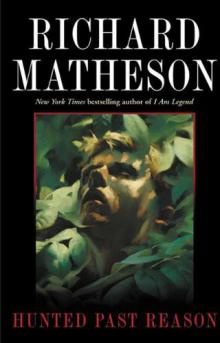 Hunted Past Reason
Hunted Past Reason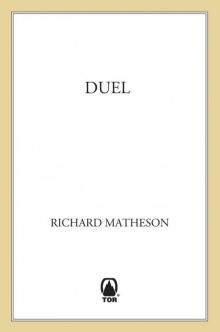 Duel: Terror Stories
Duel: Terror Stories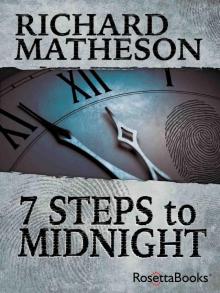 7 Steps to Midnight
7 Steps to Midnight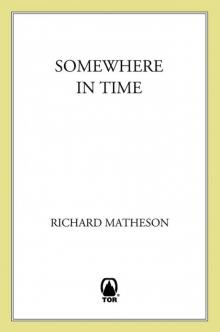 Somewhere in Time
Somewhere in Time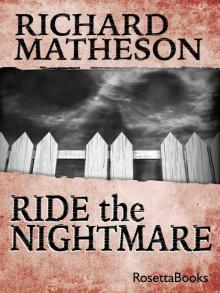 Ride the Nightmare
Ride the Nightmare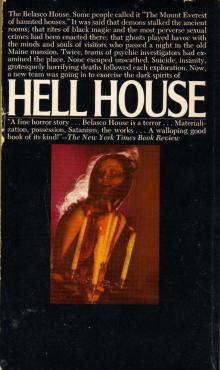 Hell House
Hell House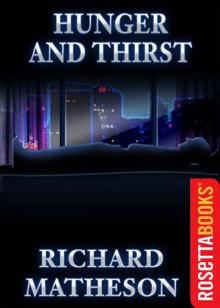 Hunger and Thirst
Hunger and Thirst Lyrics
Lyrics Other Kingdoms
Other Kingdoms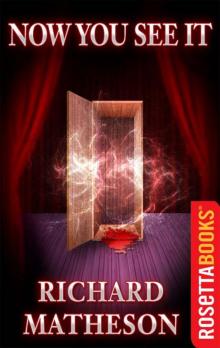 Now You See It . . .
Now You See It . . .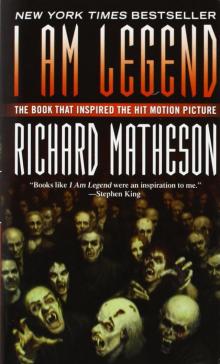 I Am Legend
I Am Legend The Box: Uncanny Stories
The Box: Uncanny Stories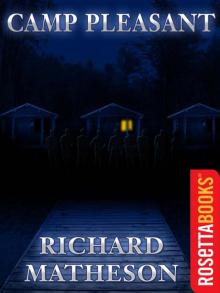 Camp Pleasant
Camp Pleasant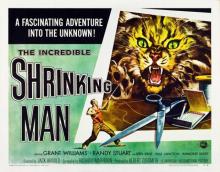 The Incredible Shrinking Man
The Incredible Shrinking Man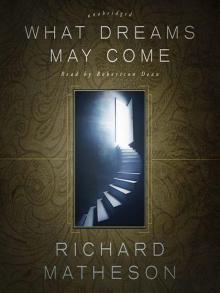 What Dreams May Come
What Dreams May Come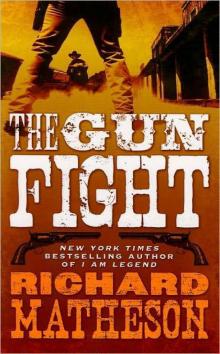 The Gun Fight
The Gun Fight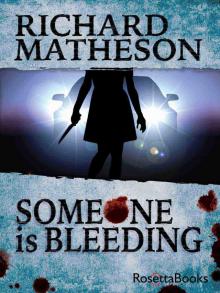 Someone Is Bleeding
Someone Is Bleeding Mediums Rare
Mediums Rare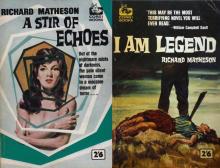 A Stir of Echoes
A Stir of Echoes Backteria and Other Improbable Tales
Backteria and Other Improbable Tales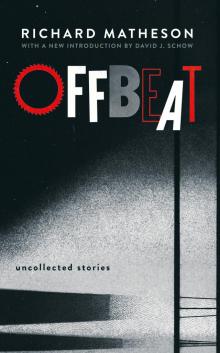 Offbeat: Uncollected Stories
Offbeat: Uncollected Stories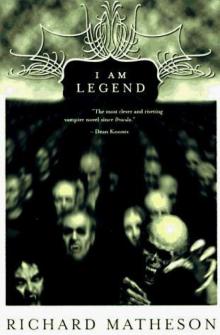 I Am Legend and Other Stories
I Am Legend and Other Stories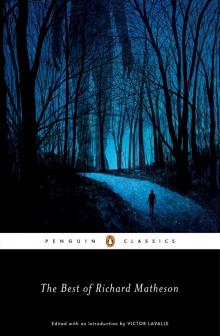 The Best of Richard Matheson
The Best of Richard Matheson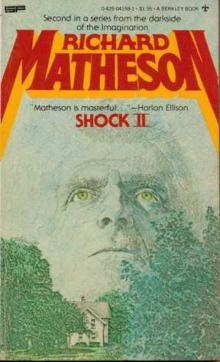 Shock II
Shock II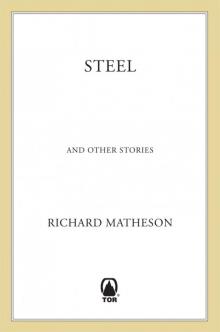 Steel: And Other Stories
Steel: And Other Stories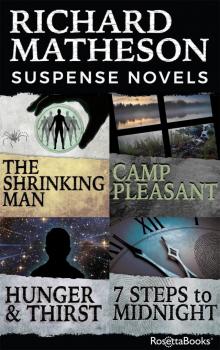 Richard Matheson Suspense Novels
Richard Matheson Suspense Novels The Link
The Link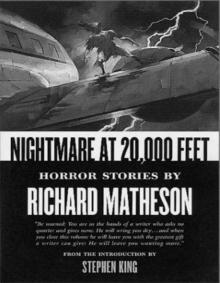 Nightmare At 20,000 Feet
Nightmare At 20,000 Feet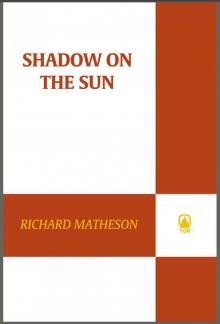 Shadow on the Sun
Shadow on the Sun![Steel and other stories [SSC] Read online](http://i1.bookreadfree.com/i/03/21/steel_and_other_stories_ssc_preview.jpg) Steel and other stories [SSC]
Steel and other stories [SSC] Created By
Created By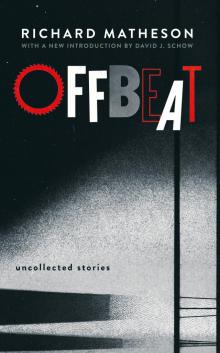 Offbeat
Offbeat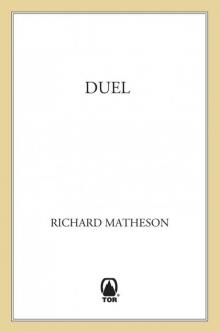 Duel
Duel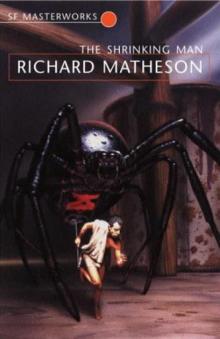 The Shrinking Man
The Shrinking Man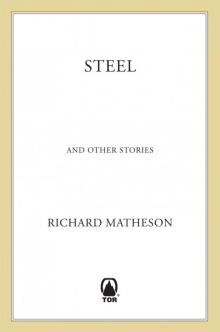 Steel
Steel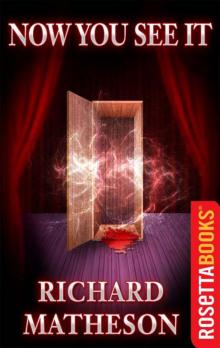 Now You See It
Now You See It